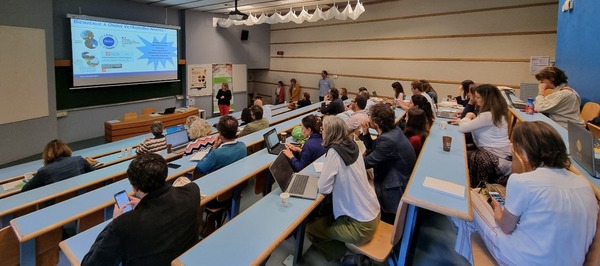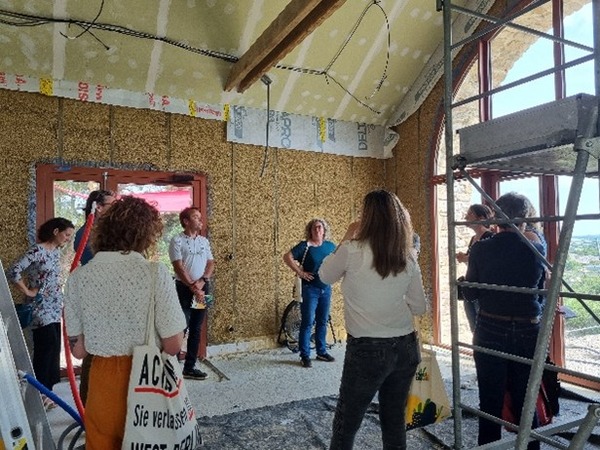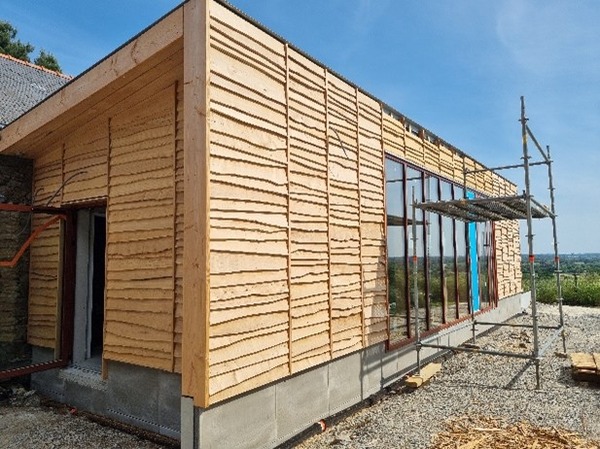Stakeholders in the French Atlantic Arc mobilised to make the most of plant by-products and fibre plants
On 20 May 2025, the work of the European SCALE-UP and RuralBioUp projects was presented in Nantes on the Géraudière campus, as part of an event dedicated to the circular bioeconomy. Organised by Végépolys Valleyand AC3A, in close cooperation with ONIRIS VetAgroBioand INRAE, the event brought together some forty participants from businesses, research bodies, agriculture, associations and local authorities, who came from the four regions of the French Atlantic Arc (Normandy, Pays de la Loire, Brittany, New Aquitaine) to discover innovative projects and develop their networks.

Welcomed on the campus of the ONIRIS engineering school, participants began the day with a plenary session dedicated to bioeconomy. Végépolys Valley and AC3A presented the results of two European projects, RuralBioUp and SCALE-UP, aimed at developing circular and sustainable bio-based value chains from locally available plant biomass resources. During their implementation, the two projects carried out networking activities, organised information sessions, and produced studies and tools to support the development of these sectors. As part of the public consultation for the update of the European strategy for the bioeconomy, the results of these and other Horizon Europe projects were presented along with policy recommendations for improving the regulatory framework and measures to support and finance bio-based industries. At the final project conference in Brussels on 14 May, the importance of strengthening the role of farmers in bioeconomy value chains was strongly emphasised (read more).
After the European news, a number of projects and approaches were presented, illustrating the diversity of initiatives and skills available in the region to convert by-products and fibre plants into bio-based products:
- The Bioloopproject presented by ONIRIS is developing ways of recovering plant bioresources considered as waste, taking into account the noblest and most profitable use on a regional scale. This multi-disciplinary project took as its case study the spent grains from urban breweries to develop 100% recyclable biosourced materials, with a view to circular management on a regional scale.
- The aim of the Tetrae RAFFUTproject, led by INRAE's Biopolymers Interactions Assemblages (BIA) unit, is to transform vegetable production residues into valuable resources, such as molecules of interest or bio-based materials, using a local biorefinery.
- The Pays de la Loire Chamber of Agricultureillustrated its work on the bioeconomy through a number of projects: RUSTICA(feasibility study for a regional bio-based fertiliser industry based on waste and by-products from the fruit and vegetable industry); VALOCEPS (recovery of vine stocks), thERN(thematic network on the recovery of residues and by-products from the animal, plant and forestry industries) and BUFFER+(production of peat-free potting soils).
- Kellig Emrenpresented its biosourced and geosourced insulation panel for buildings, made from miscanthus, earth and lime. The panel offers numerous advantages, including winter and summer comfort, regulation of ambient humidity, fire resistance and reversibility at the end of its life.
- The Impro3D project presented by ONIRIS involves the construction of a collective 3D food printing workshop, the Fabrique Hal'Impro, to imagine, test and co-create new culinary applications using plant by-products, as part of an open innovation approach.
The morning ended with a visit to the ONIRIS food technology hall, a 3,000m² research facility with over 120 pieces of equipment (heat treatment, concentration, drying, packaging, etc.), which enables students to experiment with technological applications on industrial-scale tools.
After a time for sharing ideas and getting to know each other over lunch, the site visits resumed in the afternoon, with two options available to participants: those wishing to find out more about making use of plant by-products continued their visits to La Géraudière, while participants interested in bio-sourced buildings visited the commune of Les Touches.
At the La Géraudière site, participants were able to watch a demonstration of 3D printing of food products from plant by-products at the ONIRIS premises (Impro 3D project), and visit the INRAE - BIA laboratory and its facilities for characterising plant by-products and products from the RAFFUT project.
In Les Touches, participants were welcomed on visits to bio-sourced buildings by the town's first deputy mayor and the project manager from the Erdre et Gesvres Community of Communes. Together, they presented their ambitious eco-building policy, highlighting several completed and ongoing projects, and explaining the objectives, challenges and technical choices that have guided their design. In this town of 2,600 inhabitants, the former town hall has been renovated to become a health centre and a coworking space. The aim was to provide healthy, attractive spaces to encourage the installation of medical and paramedical professionals. The choice of bio-sourced materials was a major political decision, requiring the project management team to develop its skills. The head of the timber frame division at Atelier ISAC, a company with a long-standing commitment to the installation of bio-based products and trained in the installation of straw in its various forms (bales, panels, chopped straw, etc.), presented the companies involved in the project and the materials used, in particular the earth-hemp thermal corrector. The Petit-Mars Children's Centre project was also presented, which will use straw insulation panels from COPANO. The day ended with a visit to the restoration site of a farmhouse that will become a restaurant, partially renovated in hemp clay with a wooden extension clad in local wood from the commune. The Chanvre et Paysansassociation brought the day's presentations to a close with a presentation on the development of the hemp industry in Loire-Atlantique.


The event demonstrated the dynamism of the players in the Loire region on the subject of the bioeconomy, and the diversity of solutions for extracting value from by-products and fibre plants. Speakers and participants emphasised the importance of research and networking in developing innovative projects that make the most of local biomass resources, while respecting the hierarchy of uses and the environment. Following on from the RuralBioUp and SCALE-UP projects, Végépolys Valley, AC3A and the Chambers of Agriculture remain committed to raising awareness of these initiatives and contributing to the development of these sectors.
Find out more
SCALE-UP project resources: SCALE-UP - AC3A
RuralBioUp bioeconomy platform: RuralSpot - RuralBioUp
